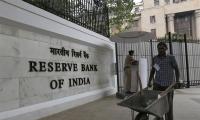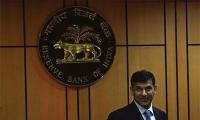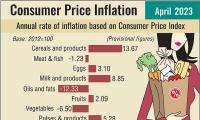Economic Survey: Remove Food From Inflation Targeting
India's Economic Survey suggests removing food from the inflation-targeting framework, arguing that higher food prices are often supply-induced. It proposes using coupons or direct cash transfers to help low-income consumers.

Illustration: Uttam Ghosh/Rediff.com
New Delhi, Jul 22 (PTI) The Reserve Bank should stop looking at food inflation in deciding interest rates and the government should explore giving coupons or direct cash transfer to poor to deal with higher food prices, the pre-Budget economic survey said on Monday.
While the inflation rate has moderated in recent months, the RBI has refrained from cutting benchmark interest rates -- which decide the rate at which home, personal and corporate loans are given by banks -- citing elevated food inflation.
India introduced the inflation-targeting framework in 2016 under which the Reserve Bank of India (RBI) is mandated to keep retail inflation at 4 per cent, with a margin of 2 per cent on either side.
The benchmark policy rates are decided bi-monthly by the RBI on the basis of movement in consumer price index, which includes food, fuel, manufactured goods and select services.
"India's inflation targeting framework should consider targeting inflation, excluding food. Higher food prices are, more often, not demand-induced but supply-induced," the Economic Survey 2023-24 said.
While retail inflation, measured by the movement in consumer price index, was at 5.08 per cent in June, food inflation was 9.36 per cent.
The RBI has kept interest rates unchanged since February 2023 on inflationary concerns.
RBI Governor Shaktikanta Das in June had said that at the current juncture, the uncertainties related to the food price outlook warrant close monitoring, especially their spillover risks to headline inflation.
Stating that monetary policy only helps in containing demand-side price pressure, the Survey said deploying them to deal with inflation caused by supply constraints may be counterproductive.
"Therefore, it is worth exploring whether India's inflation targeting framework should target the inflation rate excluding food. Hardships caused by higher food prices for poor and low-income consumers can be handled through direct benefit transfers or coupons for specified purchases valid for appropriate durations," the Survey said.
The core or manufactured inflation fell to a four-year low in 2023-24, while appropriate administrative actions, including dynamic stock management, open market operations, subsidised provision of essential food items and trade policy measures, helped mitigate food inflation to a great extent.
The expectation of a normal monsoon and moderating global prices of key imported items give credence to the benign and range-bound inflation projections for India made by the Reserve Bank of India and the International Monetary Fund.
"Beyond this, the medium to long-term inflation outlook will be shaped by the strengthening of price monitoring mechanisms and market intelligence as well as focussed efforts to increase the domestic production of essential food items like pulses and edible oils for which India has a great degree of import dependence," the Survey said.
The RBI projects retail inflation for 2024-25 at 4.5 per cent, lower than 5.4 per cent in the last fiscal.
While the inflation rate has moderated in recent months, the RBI has refrained from cutting benchmark interest rates -- which decide the rate at which home, personal and corporate loans are given by banks -- citing elevated food inflation.
India introduced the inflation-targeting framework in 2016 under which the Reserve Bank of India (RBI) is mandated to keep retail inflation at 4 per cent, with a margin of 2 per cent on either side.
The benchmark policy rates are decided bi-monthly by the RBI on the basis of movement in consumer price index, which includes food, fuel, manufactured goods and select services.
"India's inflation targeting framework should consider targeting inflation, excluding food. Higher food prices are, more often, not demand-induced but supply-induced," the Economic Survey 2023-24 said.
While retail inflation, measured by the movement in consumer price index, was at 5.08 per cent in June, food inflation was 9.36 per cent.
The RBI has kept interest rates unchanged since February 2023 on inflationary concerns.
RBI Governor Shaktikanta Das in June had said that at the current juncture, the uncertainties related to the food price outlook warrant close monitoring, especially their spillover risks to headline inflation.
Stating that monetary policy only helps in containing demand-side price pressure, the Survey said deploying them to deal with inflation caused by supply constraints may be counterproductive.
"Therefore, it is worth exploring whether India's inflation targeting framework should target the inflation rate excluding food. Hardships caused by higher food prices for poor and low-income consumers can be handled through direct benefit transfers or coupons for specified purchases valid for appropriate durations," the Survey said.
The core or manufactured inflation fell to a four-year low in 2023-24, while appropriate administrative actions, including dynamic stock management, open market operations, subsidised provision of essential food items and trade policy measures, helped mitigate food inflation to a great extent.
The expectation of a normal monsoon and moderating global prices of key imported items give credence to the benign and range-bound inflation projections for India made by the Reserve Bank of India and the International Monetary Fund.
"Beyond this, the medium to long-term inflation outlook will be shaped by the strengthening of price monitoring mechanisms and market intelligence as well as focussed efforts to increase the domestic production of essential food items like pulses and edible oils for which India has a great degree of import dependence," the Survey said.
The RBI projects retail inflation for 2024-25 at 4.5 per cent, lower than 5.4 per cent in the last fiscal.
You May Like To Read
TODAY'S MOST TRADED COMPANIES
- Company Name
- Price
- Volume
- Vodafone-Idea-L
- 11.65 (+ 3.56)
- 106772451
- Alstone-Textiles
- 0.28 ( -3.45)
- 44187760
- Mangalam-Industrial
- 0.88 ( -2.22)
- 39177573
- Sunshine-Capital
- 0.27 (+ 3.85)
- 35956340
- GMR-Airports
- 104.40 (+ 6.37)
- 30453005





